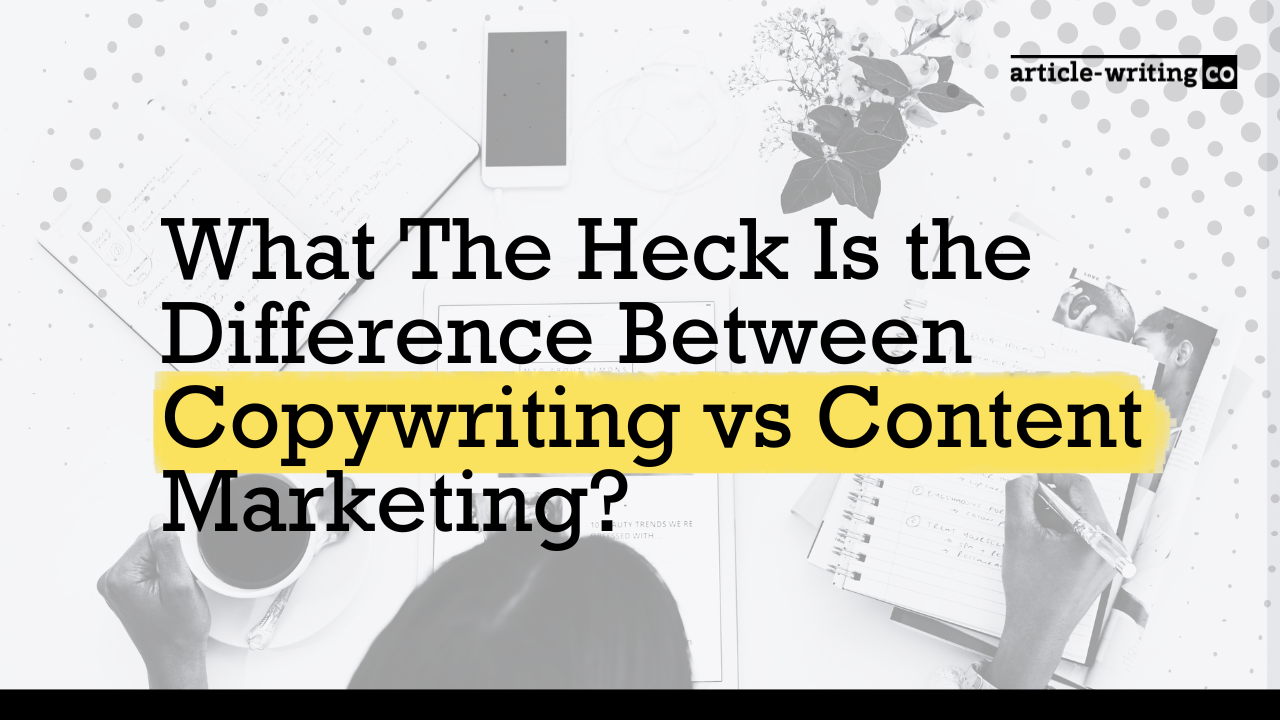Content marketing and SEO copywriting both play vital roles in the success of your business. Regardless of which stage your business is in, both practices remain crucial to keep your brand afloat and consistently draw in new customers through a comprehensive content marketing system. But, copywriting vs content marketing seems to be an age-old debate on which is better and how they’re different.
The two terms are often used interchangeably. On the surface, they may seem to strive towards the same goal: drawing in clients. But much more goes into each practice and we’re going to explain them here.
What is Content Marketing?
Content marketing is a strategic approach to marketing that focuses on creating and distributing high-quality, relevant content. The end goal is to attract and retain customers in your target audience with the purpose of generating sales.
Where You’ll Find Content Marketing
If you haven’t already guessed, content marketing comes in many forms. The best marketing efforts stretch across a vast landscape, including:
- blog posts
- infographics
- social media posts
- website copy
- video content
What is Copywriting?
Unlike content marketing, which is free, valuable content for users, copywriting has an ulterior motive. The purpose of copywriting is to get customers (or potential ones) to act on something. Great SEO copywriting entices customers to buy from your business, download gated content, or sign up for a newsletter.
Where You’ll Find Copywriting
Copywriting is often found on sales pages or through avenues for lead generation. You’ll typically find it in these places:
- email campaigns
- CTAs (call-to-action)
- flyers
- landing pages
- ad campaigns
Copywriting vs Content Marketing
There’s no reason these two should compete. In fact, when you use them in tandem, they complement each other really well. The only issue is that you need to find a solid balance between the two.
How Do They Go Hand in Hand?
Your mindset shouldn’t be “copywriting vs content marketing”. Instead, you should think, “copywriting and content marketing”. They’re two sides of the same coin. Your content can draw customers and viewers to your site. But, when it comes time to start marketing, you’ll need solid copy to get your message across and promote your brand. And how far can your copy go without great content? One supports the other.
How to Implement Both in Your Business
Quick Tips for Effective Content Marketing
With so many ways to implement content marketing, you should know some easy ways to ensure it’s effective.
- Publish your best content consistently. This is a good rule of thumb for any writer, really. If you think your work is just so-so, work on it until it’s up to code for you. Your audience can tell if something isn’t quite as good as what they read from a competitor’s website.
You’ll also want to make sure you stick to a publishing schedule. If you’re thinking of having a piece up once every week, go for it. If it seems like an unrealistic goal, try publishing bi-weekly. Regardless of which route you decide to take, make sure you stick to it.
- Ensure your brand’s voice is present. No matter where you publish content (your site, on social media, etc.), your brand’s voice needs to be present. Consumers, both current and future, come to expect brand voice across all channels. It helps them associate you with the kind of tone you want to convey.
3. Repurpose your content. There’s no shame in recycling the awesome content that you create. It took time, effort, and a lot of research, so why not? If you see that some articles are top-performers on your site, convert them into ad copy or turn it into a YouTube video.
Quick Tips for Effective Copywriting
Copywriting is just as much an art as it is a form of writing. When it comes time to create some attention-grabbing copy, you can keep the following steps in mind.
- Keep things clean and concise. Your content can go deep in a blog post. But, copywriting needs to get to the point and keep things simple. Use powerful language to attract audience attention and ensure you get your point across as quickly and naturally as possible.
- Include power words. Power words can refer to things like “you,” “guarantee,” “money,” and “stress”. They’re words that catch people’s attention and speak to them directly. These words can also get to the heart of the issue and address pain points right in the headline.
- Be authentic. No one likes seeing copy and feeling like they’re being sold to. Copywriting takes finesse. You need to walk a fine line between persuading customers without patronizing or blatantly selling to them. Don’t promise things you can’t deliver and keep things honest.
Conclusion
Hopefully this ends the copywriting vs content marketing debacle. Remember that they work well together, not apart. Your marketing efforts will only improve when these practices are applied side-by-side. It’s going to take some time to master both forms, but don’t let that deter you from learning the ropes.

David is the Founder and Director of article-writing.co, the fastest-growing content creation agency in North America. He has transformed companies by offering high-quality content that has impacted their SEO ranking, revitalized websites with engaging and industry-relevant blogs and website copy, and championed successful email campaign copy.




